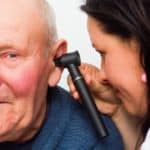
Two-thirds of Americans experience hearing loss by the time they’re in their 70s. Studies show that decreased hearing results in higher rates of cognitive decline and dementia in the elderly.
The flip side of that coin is that improved hearing may help stave off cognitive decline.
And hearing aids are more discreet and technologically advanced than ever before.
Are you worried about your hearing? Do you ask your friends and family to repeat themselves a lot?
Don’t worry! A simple hearing test can tell you if you need hearing aids.
Read on to learn more about what to expect.
A SIMPLE HEARING TEST
Unlike many routine exams, most people don’t get their hearing checked every year. But it’s important to get your hearing checked on a regular basis.
Regular hearing exams help catch hearing loss before it progresses.
Hearing test exams are non-invasive and painless.
Here’s what happens when you go to a hearing health professional.
PAPERWORK FIRST
As with all medical settings, you’ll fill out some paperwork first.
Be ready to answer some basic questions about:
- Your insurance coverage
- Your medical history – for instance, a traumatic brain injury may affect hearing
- Your medications
- Any hearing concerns or ear-related medical history, such as ringing in the ears
VISUAL EXAM
It’s possible to have physical blockages in the ear canal that affect hearing. For instance, a simple buildup of earwax may be blocking your hearing.
The hearing specialist uses an otoscope to visually inspect the ear canals.
TYPES OF HEARING TESTS
Different types of hearing tests are used to narrow down the root cause of hearing loss.
These tests take place in a sound-proof booth. This keeps other noises from interfering with the results.
The tests include the following:
Tuning-fork test:
A tuning fork is tapped by the specialist. This produces a noise. The tuning fork is held in different places around your head to measure what you hear.
Pure-tone audiometry:
A set of headphones is placed on your head. Different sounds at differing pitches are played into the headsets. You’ll press a button to indicate what you hear and in which ear.
Bone-conduction test:
This may sound scary, but it’s painless!
The specialist uses a probe that vibrates. It’s placed against your skull behind your ear. This tests how well your inner ear hears sound conducted through bone.
Tympanometry:
The hearing instrument specialist inserts a small plug into your ear. A machine changes the pressure in the ear canal to measure whether or not you have fluid in the middle ear.
Speech recognition:
During this test, you’ll hear speech through a set of headphones. Some of the speech may be played against noise in the background.
This helps test how well you recognize speech without visual and facial cues.
It seems like a lot of tests, but it’s all painless.
It’s important to have your hearing checked. Hearing plays such a vital role in everything you do. It’s equally important to protect your hearing.
Hearing professionals don’t always perform all of these tests.
YOUR HEARING IS IMPORTANT!
Your ability to hear impacts relationships, work, and quality of life. Don’t take your hearing for granted.
Be sure and get a hearing test every year. Schedule it on the same day as your annual physical so you won’t forget.
Need more information? Click here to learn more.
